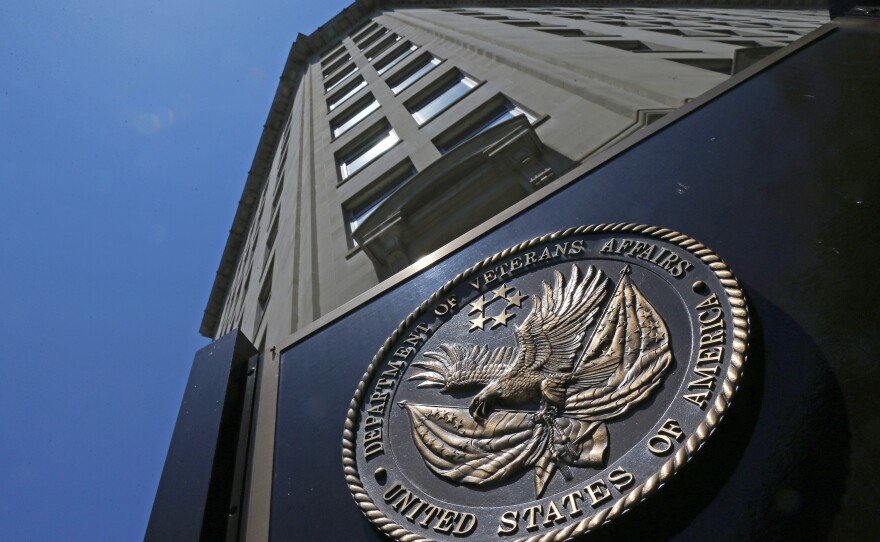The Veterans Health Administration in 2017 offered to treat vets who don’t normally qualify for care because they earned a less-than-honorable discharge. Almost no one used the program.
Now veterans' groups are hoping a change in the program will help that group of veterans when they struggle with thoughts of suicide.
Roadside Bomb
At his home outside San Diego, former Marine Lance Cpl. Josh Onan keeps some photographs next to his TV. The photos are from his days as a Marine. In 2006, he was in Ramadi, Iraq when his Humvee was hit by a roadside bomb.
“I remember laying down in the truck. Waking up, there is dust and debris all over me,” Onan said. “And there was an Iraqi colonel, who is sitting in the truck with us and he’s just screaming, screaming and I don’t understand what he’s saying. So, that’s when I realized, 'Oh here we go, something big is happening.'”
During the next year, Onan would be in and out of trouble: small infractions, which he chalks up to the amount of medication prescribed for his head injury and post-traumatic stress disorder. Then, while on leave, he was caught with a small amount of cocaine. That was it. He was kicked out of the Marines.
Onan looks at a picture of himself in his battle gear.
“I’m 32 years old now, and this guy is 20, and I look up to this guy,” he said. “I know it’s me but I miss everything about him. Sometimes it’s hard to find this guy.”
Onan is one of the thousands of veterans who have other-than-honorable discharges. They don’t typically qualify for VA benefits, even though vets like Onan have a high suicide rate.
To address that, the VA last summer started a new program: this group of veterans can come into the VA and be treated for mental health issues at least for 90 days.
KPBS asked the VA how many people used the program in the first year. The VA figures show nationally 115 veterans used the program. Advocates said the number is a fraction of the veterans who would now qualify for mental health care. Twenty-five of those patients were in San Diego.
“They came in saying they had an urgent need and they were evaluated and received care for that urgent need whether it was a substance use disorder or suicidal thoughts,” said Dr. Neal Doran, of VA San Diego.
Veterans advocates are disappointed that just 115 people took advantage of the program. The VA released figures last year that estimated there are more than 500,000 veterans with other-than-honorable discharges.
“It’s not possible that that’s the number of people who need help. It’s a failure to contact them. To fully inform them. And to break the stigma,” said Kristofer Goldsmith, an Iraq vet who works with the Vietnam Veterans of America.
Vietnam Veterans of America lobbied the VA to help veterans with other-than-honorable discharges.
“It’s a program that most people who are eligible for haven’t heard of. Because the VA refused to do any outreach,” said Vietnam Veterans of America Executive Director Rick Weidman.
He said the VA just didn’t promote the program.
There was an internal debate over whether the VA could pay to reach out to veterans who normally don’t qualify for VA care, Weidman said.
Illness Related To Service
The stakes are about to get higher.
Sen. Chris Murphy, D-Connecticut, along with a bi-partisan group of lawmakers, was able to insert language in a budget bill that turned the VA program into law. The new law will make all vets with other-than-honorable discharges eligible for mental health care if their illness is related to their service. The VA is also required to actively seek out the veterans who qualify.
The law also removes the 90-day cap, which makes the program begun last year even harder to navigate, according to Kate Richardson. She's the legal director for Swords to Plowshares, which has worked with other-than-honorably discharged veterans since the Vietnam War.
The VA has 180 days from when the law passed in March to start the new program. Finding those veterans will still be difficult.
“I felt shunned. I still feel shunned,” Onan said.
After years of being rejected, Onan now is getting his PTSD treatment paid for by the VA. He said treatment has been a lifesaver, but he fears the alienation he felt will make it difficult for other vets to seek help.
“I wouldn’t be surprised that a lot of them aren’t alive,” he said. “And the reason I say that, is without treatment and without proper care, even loved ones. I don’t think I could have done it without God and my family. Every day I tell my wife, 'I’m done. I’m done.'”
The VA has not released details about how the new program will operate.
The VA released a written statement: “In July 2017, VA started providing urgent mental health care to former service members with Other Than Honorable (OTH) discharges. VA is currently in the process of writing implementation regulations which will provide further guidance on expanding mental health care outreach to service members in need.”






